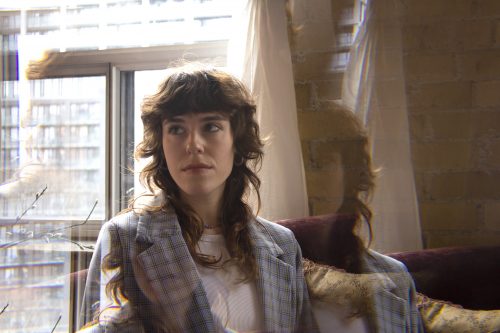Rachel Bobbitt, the emerging Canadian singer-songwriter, could be seen as a study in contradictions. She gained a following as a teenager by performing other people’s music on Vine, the since-shuttered short-video app, but it’s her original material that’s really worth hearing. She studied jazz vocals in college but says she’s also benefited from not being as adept on guitar.
Her new EP, “The Ceiling Could Collapse,” hones in on life’s contradictions and tries to make sense of them, to the point where they’re not as contradictory as you might have thought. The Nova Scotia native, who is based in Toronto, touched on these dynamics in our recent chat in advance of her Friday, Nov. 18 show at Mercury Lounge.
“The Ceiling Could Collapse” is based around extremes and emotions, such as joy and pain. Did certain events in your life inspire specific songs?
Definitely. Moving away from my family when I was 18 was really hard, and I spend a lot of time feeling guilty and anxious about the time I miss with them. We also suffered a loss in the family a few years ago that both deepened our connection to each other and created emotional distance in equal parts. I think examining the extremes of life and trying to make sense of them can feel like giving yourself more of a manageable middle ground to make sense of.
Despite the heaviness of the content, there’s a certain breeziness to the music. Was that intentional?
I feel like that’s due to my guitarist/producer Justice Der. He has a knack for creating lift in a track and providing levity where songs may need it with really simple but effective guitar parts. He has a dreamlike quality to his playing and production that really balances out my sometimes overly dramatic writing tendencies.
How did you first connect with Justice? How would you describe your musical relationship with him?
We first connected through Humber College. We were both studying music there, and became fast friends and collaborators. It’s the most natural music partnership I’ve ever been a part of. We’re never stepping on each others toes — he fronts the instrumentation and I add lyrics/some melody — I feel like we both highlight each other’s natural strengths.
What were you listening to when you were working on these songs? Do you think that what you were listening to at the time influenced them?
I was listening to a lot of The National, which definitely crept in — I love their thematic approach to songwriting. They create such a world, I wanted to try to do something similar. I was also listening to a lot of Jeff Tweedy/Wilco, and trying to dissect his lyrical style. It’s so intricate and surprising; my favorite lyrics mix confessional with word painting and I feel Jeff Tweedy is a master at that.
Tell us a bit about the type of shows you’re performing on this tour. Are you playing with a band or solo? How much of “The Ceiling Could Collapse” are you playing?
We’re playing as a band, with a few shows being trio (minus Justice on guitar.) It’s equal parts “The Ceiling Could Collapse” and new songs from an upcoming EP, which I’m very excited about.
What instrument did you focus on at Humber Music College?
It was a jazz program, and I was a vocalist. We also had fundamentals for things like piano, ear training, theory etc.
Why did you leave the program?
For me Humber was a great reason to move out of my small hometown in Nova Scotia. It provided an amazing community of musicians who I still work with and are now some of my best friends. It got to a point, though, where I felt like I wasn’t making music to make time for music school, which just felt redundant. The culture in a jazz school can also be so exhausting — so much talk about how much you practice and what ensembles you’re in. Not to mention the belittling comments I and many other women experienced from profs and other students. I felt like it was pulling out all the parts of music I loved and wringing them out, and eventually I felt like I had to leave in an attempt to preserve them.
When did you first start playing an instrument? Did you take lessons as a youngster?
I first started singing when I was in grade one or two, and started taking lessons around then. I also took guitar and piano lessons, but I wasn’t one to practice those as much.
How do you feel your training impacts the music you make?
I think my vocal training allows me to experiment a bit more with range/approach, which I’ve only recently started getting into more. For a long time I associated strong/acrobatic vocals with classical or jazz, and tried to minimize that part of my voice as much as possible. Only at this point am I using that knowledge in what I feel is an explorative way, and not a judgmental way. I don’t have much training at all on guitar, which I think opens the instrument up a bit more for me to mess with weird tunings and approaches. I’m definitely not the best guitar player, but I’m slowly figuring out how to get the sounds I want out of it.
Tell me about the transition from covering songs on Vine to writing your own songs.
It was actually a really hard transition. It felt like writing my own music would go against what people had come to expect from me, which was hard to deal with when I developed my audience at the age of 13. By 17 when Vine shut down I felt really confused, borderline washed up and incapable of creating music that excited me. When I had some years away from having people constantly telling me online what they thought of me/the music I was making, I was able to center myself a bit more and start creating what I wanted to make as opposed to what I thought people would like me to make.
How was your experience touring with Indigo de Souza?
It was amazing. I have been a massive fan of her for years, so to say I was starstruck is an understatement. I feel we as a band learned so much even in the few shows we played with them, and they were so kind.
What do you have planned for the rest of the year and 2023?
Getting ready to release some new music! Which I’m super stoked about. Planning on playing more shows, writing more and recording some new stuff as well.
Photo by Paige Paton




Leave a Reply